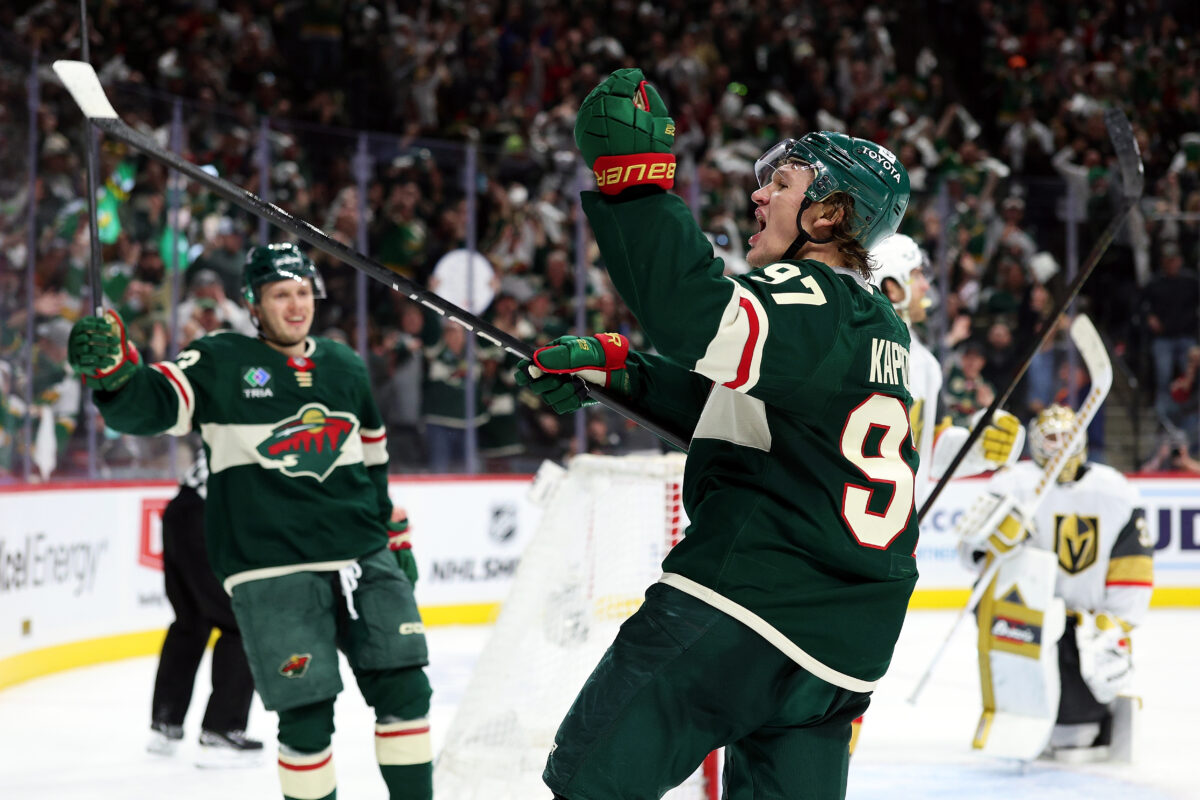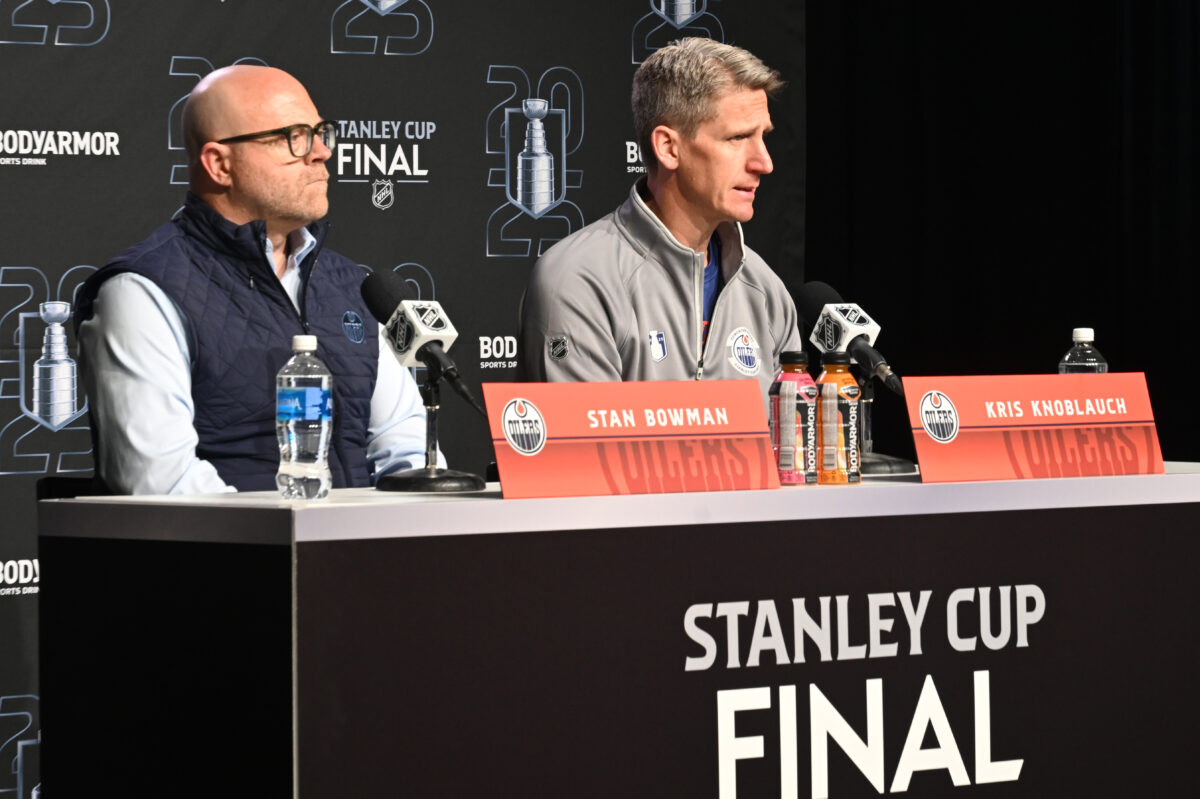The NHL has always been the youngest brother of the four major sports leagues in North America. The NFL, NBA, and MLB have reigned supreme, bullying the NHL in viewership and revenue.
Often, the disparity became most apparent when someone like Shohei Ohtani signed a $700 million contract with the Los Angeles Dodgers—a sum of money that’s difficult to comprehend. We need not look only to recent times, though. A list of the most expensive sports contracts in history reveals not a single NHL player.
That the NHL didn’t fight in the same weight class never bothered fans, except perhaps that we want everyone to know the joy that comes from following the best sport in the world. Who cares, really, if our league didn’t produce the same revenue as the other three? As I tell people, I’ve never introduced someone to hockey who didn’t like it and (maybe slowly) feel the allure.

We know we have treasure, and, in our minds, salaries, the salary cap, escrow, deferred money, hockey-related revenue, and any other financial terms will never equal that treasure in value.
Of course, that belief always remains in tension with the reality that the NHL is a business. Like any business, the primary purpose is to make money. As of late, the NHL has done exceptionally well at making money, triggering a projected rising salary cap for the next three seasons. The unprecedented ceiling of $100-plus million signals the financial health and stability of the league, a reassurance no one laments.
However, the law of unintended consequences never rests. Already, we’ve seen players vie for their well-deserved slice of the ever-growing pie. $136 million to Kirill Kaprizov evidenced that. But as players like Logan Cooley reject a $77 million offer from the Utah Mammoth, a new tension surfaces between the “we” that defines hockey and the “me” that drives players.
Kaprizov and the Market Reset
On Oct. 2, 2024, Wild owner Craig Leipold said, “I will tell you nobody will offer [Kaprizov] more money than us, or longer (years), so all we have to do is prove to him that we want to win.” At that point, everyone knew that Kaprizov had all the leverage. He would be paid a lot of money. It was only a matter of how much and when.
Related What Kaprizov’s Contract Means For the Minnesota Wild
When Kaprizov rejected the Wild’s initial eight-year, $128 million offer, concern naturally arose about whether he wanted to stay in Minnesota. We soon learned that rejection had little to do with the team or even the term of the contract. No, Kaprizov wanted to make as much money as he could. “So obviously, [with] Kaprizov, he wanted the big contract, and he got the big contract,” said Elliotte Friedman.
What empowered Kaprizov to squeeze an extra $8 million from the Wild? Well, when the owner of the team tells you they will offer you the most money, why would you not push the limit?
happy Sunday…here is 6 minutes of some of our favorite Kirill Kaprizov goals 🤭 pic.twitter.com/ayjWk5VJ8n
— Minnesota Wild (@mnwild) October 5, 2025
But other factors strengthened his position. The Wild couldn’t afford (literally) to lose him. Key players like Matt Boldy ($7 million), Joel Eriksson Ek ($5.25 million), and Brock Faber ($8.5 million) are signed long-term at reasonable cap hits. And the rising salary cap made available the most money a hockey player has ever been paid.
Kaprizov simply cashed in on these conditions aligning like the constellation of Orion in the night sky.
Suddenly, that $136 million payout makes the NHL more confident standing next to the NFL, MLB, and NBA. Kaprizov would be the 47th highest-paid player in the MLB, the 26th in the NFL, and the 55th in the NBA. Put another way, he’s not only making the most money in the NHL, but he’s also making more money than most athletes in these leagues.
Debates will ensue over Kaprizov’s contract. Is he overpaid? Did he handcuff his team? Does he really want to win? Time will tell. He’s undeniably made “getting paid” more palatable in the NHL, a concept the league’s always lagged in adopting, a differentiating factor, for better or worse, that separates the NHL from the other leagues.
That’s changed.
Hockey Players Are Competitive in Every Aspect
The NHL didn’t always have a salary cap. Players didn’t always know what their teammates or opponents made. Though salary disclosure developed over time (there were infamous leaks as well), the hard salary cap implementation in 2005 coincided with the official revelation of what every player made.
Complete transparency for the first time in league history certainly contributed to a rise in overall player salaries. Comparable players and their salaries provided agents with more ammunition to advocate on behalf of their clients. And, with the hard cap in place, both sides knew exactly how much money the team could afford to pay. Ultimately, players and agents had much more leverage with which to negotiate.
But another unintended consequence, neither inherently good nor bad, pitted player against player. In the hard cap era, every dollar one player makes means another player makes one dollar less. Players now know exactly how much money each player commands. And if you think they are only competitive on the ice, well, let’s just say they want to win at everything.
This is from 1990, 2 years before Bob Goodenow took over the NHLPA and before mandatory salary disclosure. Once Bob got to work for the players, NHL salaries took off. @NHLPA pic.twitter.com/UCBMr7qySm
— Allan Walsh🏒 (@walsha) September 15, 2025
This isn’t to say that any player holds it against another for making as much money as he possibly can. In fact, you’ll find most players want their peers to “get paid.” But you better believe they say to themselves, “I can’t believe this guy makes more than me!” if they think they are the better player.
Again, these are professional athletes. They are competitive. That feeling’s also entirely natural. Anyone who’s worked a day in their lives can relate. Hockey is also a job for these players. They want to be compensated for what they’re worth, as we all do.
The “Me” Culture vs. the “We” Culture
Unlike the rest of the population, NHL franchises have to balance compensating their employees (the players) with winning. With a limited amount of money to spend, every decision about where to allocate that money comes at a cost beyond the money that’s transferred to a player’s bank account.
Thus, an unspoken tension arises between the “me” culture of “getting paid” and the “we” culture of winning as a team. From the front office perspective, every dollar allocated to one player means there’s one less dollar to pay another. So, how do teams maximize their money when players have every right to “get paid” but teams have every incentive to pay as little as possible?
In the past, the players carried the onus, as they were expected to take less money and leave more for general managers to build a competitive team. If that sounds somewhat unfair, contradictory, or at least confusing, it is.

Players want to make as much money as they can. Players know how much money is available. They also know what other players make. But don’t make as much money as you can because then you’re preventing your team from winning.
This is the “me” versus “we” struggle that’s raged since the hard cap’s codification. And it’s prevented players from “getting paid” as much as they could because it’s taboo and practically untenable.
That’s why Kaprizov’s contract, in theory, has broken a barrier. He leveraged his position to earn as much money as he could while not completely crippling the Wild. Of course, none of it would be possible without a rising salary cap. But he’s proved it’s possible.
Perhaps the “me” and “we” cultures aren’t in constant tension anymore. Pending unrestricted free agents like Jack Eichel and Cale Makar could follow Kaprizov’s lead and say, “If he can do it, why can’t I?”
The path forward doesn’t look as rocky as before. Maybe, just maybe, we’re entering the era where NHL superstars will be paid on par with other major sports leagues’ superstars.
The McDavid Curveball
Connor McDavid just had to throw a curveball, didn’t he? He signed a two-year, $25 million extension with the Edmonton Oilers on Monday. Plenty of metaphorical ink has already been spilled on what a discount he’s given to the franchise to keep the Oilers competitive.
More broadly, McDavid’s extension will certainly have ramifications for elite players’ contract negotiations. Many worry he undermined Kaprizov’s breakthrough with one stroke of the pen. Colby Cohen told Jeff Marek on The Sheet:
It’s great for the Edmonton Oilers fanbase, and it’s great for the Edmonton Oilers. It is terrible for every other player in the National Hockey League for Connor McDavid to take the contract he did. He just gave every other general manager in the NHL leverage to say, ‘Look what Connor McDavid did.’
The sentiment rings true, but this argument isn’t particularly compelling. Oddly enough, Kaprizov’s record-setting contract proves why. He cashed in because every factor in the equation weighed in his favor. Had McDavid signed this contract before Kaprizov, it wouldn’t have undermined Kaprizov’s position in the slightest. The Wild needed him more than he needed them.
Related: Oilers’ Stan Bowman Under Immense Pressure to Bring Stanley Cup to Edmonton
Eichel will have the same leverage now as he did before McDavid signed. Kyle Connor will have the same leverage. Name your upcoming unrestricted free agent, and his situation will be the exact same as before McDavid signed. That’s because McDavid’s situation is unique, and so is Eichel’s, and so is Connor’s, and so is Makar’s.
Isn’t that why Kaprizov “got paid”?
Ultimately, McDavid and Kaprizov highlight two distinct attitudes: McDavid the “we” and Kaprizov the “me.” McDavid wants to win. Kaprizov wanted to “get paid.”
I’m not arguing that one philosophy is superior. But as I wrote above, as much as the NHL is a business, it’s a competitive sports league where the employees/players want to win. Sometimes money will take second place. As Cohen also said, “It’s what sets us apart from all the other major professional sports.”
The NHL Will Never Be in the Same Major League Tier
For that reason alone, the NHL will never reach the same stratosphere as the MLB, NFL, or NBA. We fans know that we have a treasure in hockey that goes beyond a total dollar amount. Players like McDavid or Sidney Crosby recognize that, too.
Players like Kaprizov remind us, though, that we shouldn’t balk at a player who maximizes his value. He’s earned that right. While the “we” culture makes hockey what it is, these are real people who are paid to lace the skates up every night. Why shouldn’t they do what’s best for themselves and their families?
Kaprizov has made the thought process more palatable. McDavid reminds us two things can be true at once.
